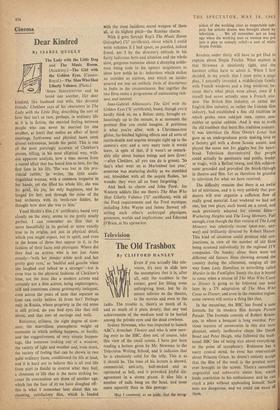Television
The Old Trashbox
By CLIFFORD HANLEY
Sydney Newman, who was imported to launch ABC's Armchair Theatre and who is now mov- ing over to the BBC, does not, of course, take this view of the small screen. I have just been reading a lecture given by Mr. Newman to the Television Writing School, and it indicates that he is absolutely solid for the telly. This is as it should be. The tone of his lecture is shrewd, commercial, anti-arty, bull-necked and as opionated as hell, and it provoked joyful dis- agreement in a dozen places. It also hits a number of nails bang on the head, and none more squarely than in this passage:
May I comment, as an aside, that the recog-
nition of the working class as respectable sub- jects for serious drama was brought about by television. . . . We all remember not so long ago when the working man or woman was put into a play as comedy relief—a sort of white Stepin Fetchit.
Readers under thirty will have to get Dad to explain about Stepin Fetchit. What matters is that Newman is absolutely right, and the harshest critics have to admit it. When I first decided, in my youth, that I must write a stage play, I naturally invented a middle-class family with French windows and a long weekend, be- cause that's what plays were about, even if I myself had never actually seen a French win- dow. The British film industry, or rather the English film industry, or rather the London film industry, had established a fine old tradition in which proles were odd-job men, comic con- stables or quaint cabbies. And it was in truth the old trashbox that burst this tradition asunder. It was television (in Alun Owen's Lena) that gave us an undergraduate prole making love to a factory girl with a dense Scouse accent, and played the scene not for giggles but for heart- break. Television demonstrated that people could ,actually be passionate and poetic, tender or tragic, with a Belfast twang, and this achieve- ment preceded and provoked the break-through in theatre and film. Let us therefore be grateful to television for what we have received.
The difficulty remains that there is an awful lot of television, and it is very unlikely that pro- ducers will ever organise a sufficient flow of really good material. Last weekend we had not one, but two plays, each based on a novel, and each previously adapted for cinema films- Wuthering Heights and The Long Memory. Fair enough, even though the film version of The Long Memory was relatively recent (post-war, any- way) and brilliantly directed by Robert Hamer. This kind of situation could produce odd con- junctions, in view of the number of old films being screened individually by the regional ITV companies. On Sunday alone there were len different old feature films showing around the country during the afternoon, ranging all the way from Lady Hamilton to something called Murder in the Footlights. Surely the day is bound to come when a reissue of The Man Who Came to Dinner is going to be followed one hour later by a TV adaptation of The Man Who Came to Dinner; and even in the remotest region, some viewers will notice a thing like that.
In the meantime, the BBC has found a sane formula for its modern film feature Picture Parade. The formula consists of Robert Robin- son, to whom a bouquet is long overdue. Pre- vious masters of ceremonies in this slot were pleasant, utterly inoffensive chaps like Derek Bond and Peter Haigh, who followed the tradi- tional BBC line of being nice about everything. to the point of sycophancy. Robinson has a nasty cynical mind, he even has reservations about Princess Grace, he doesn't entirely accept that the film of the week is the greatest story ever brought to the screen. There's something ungrateful and subversive about him, which lends conviction to his enthusiasms; and he can crack a joke without applauding himself. Such men are dangerous, and we could use more of them.


































 Previous page
Previous page